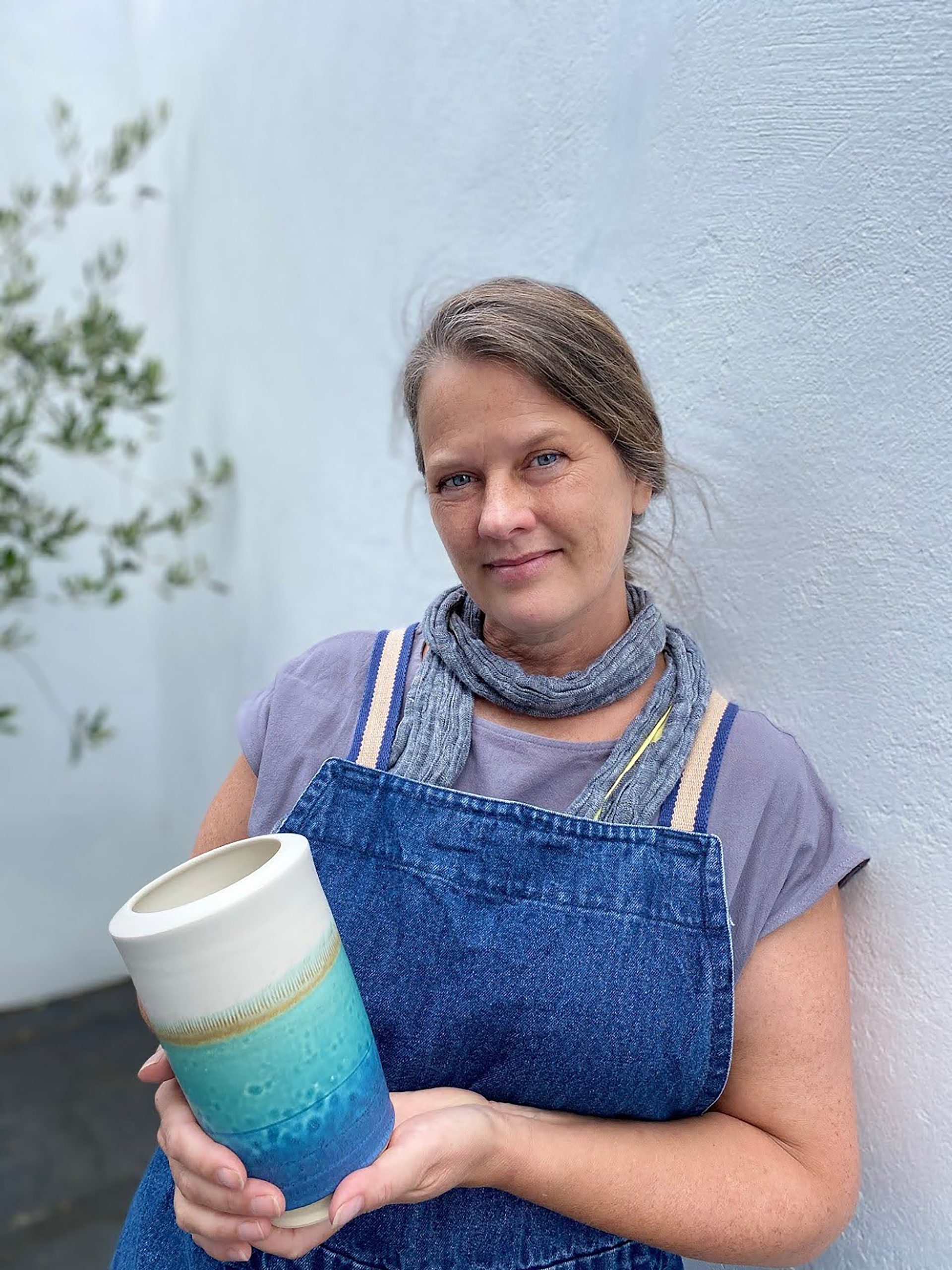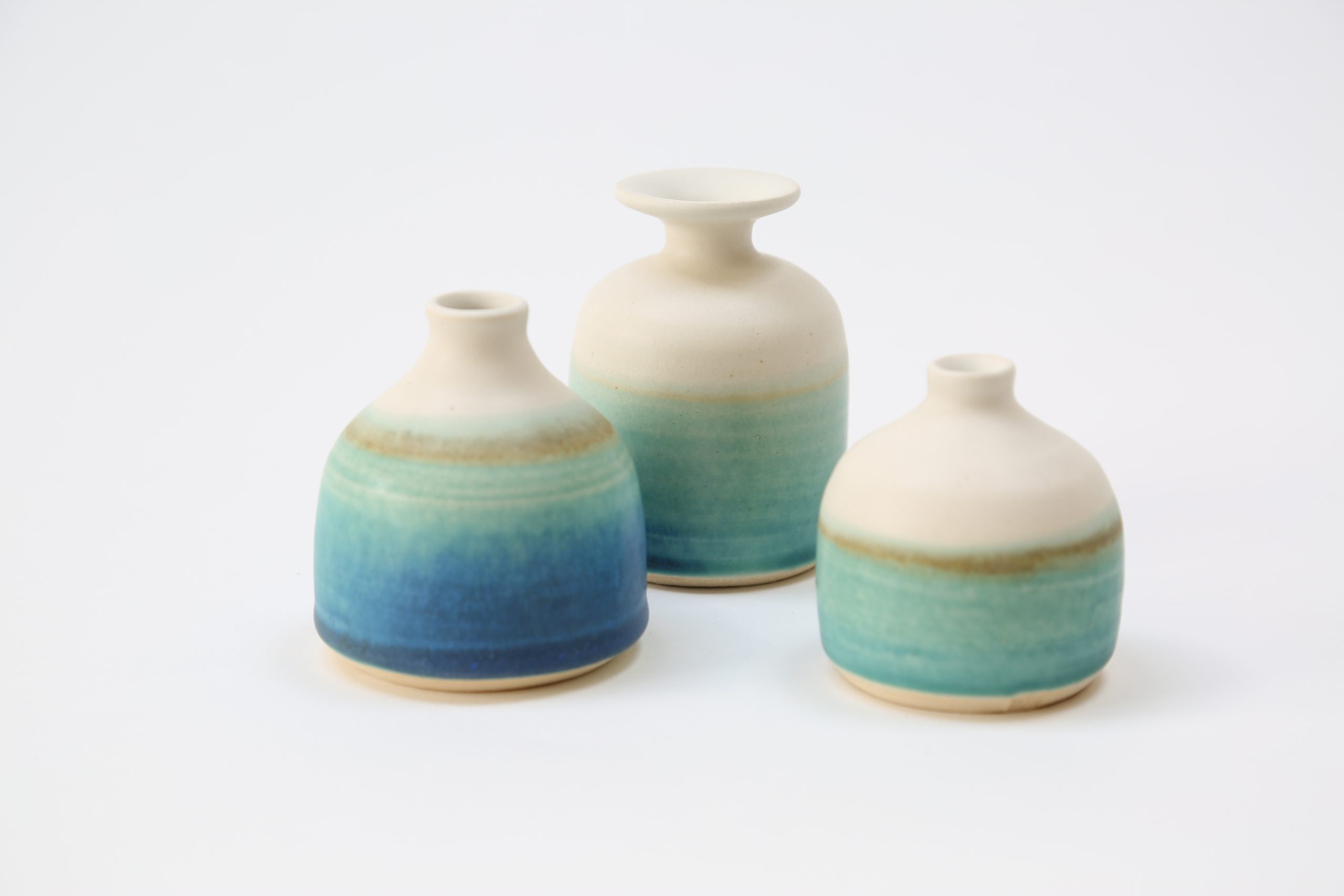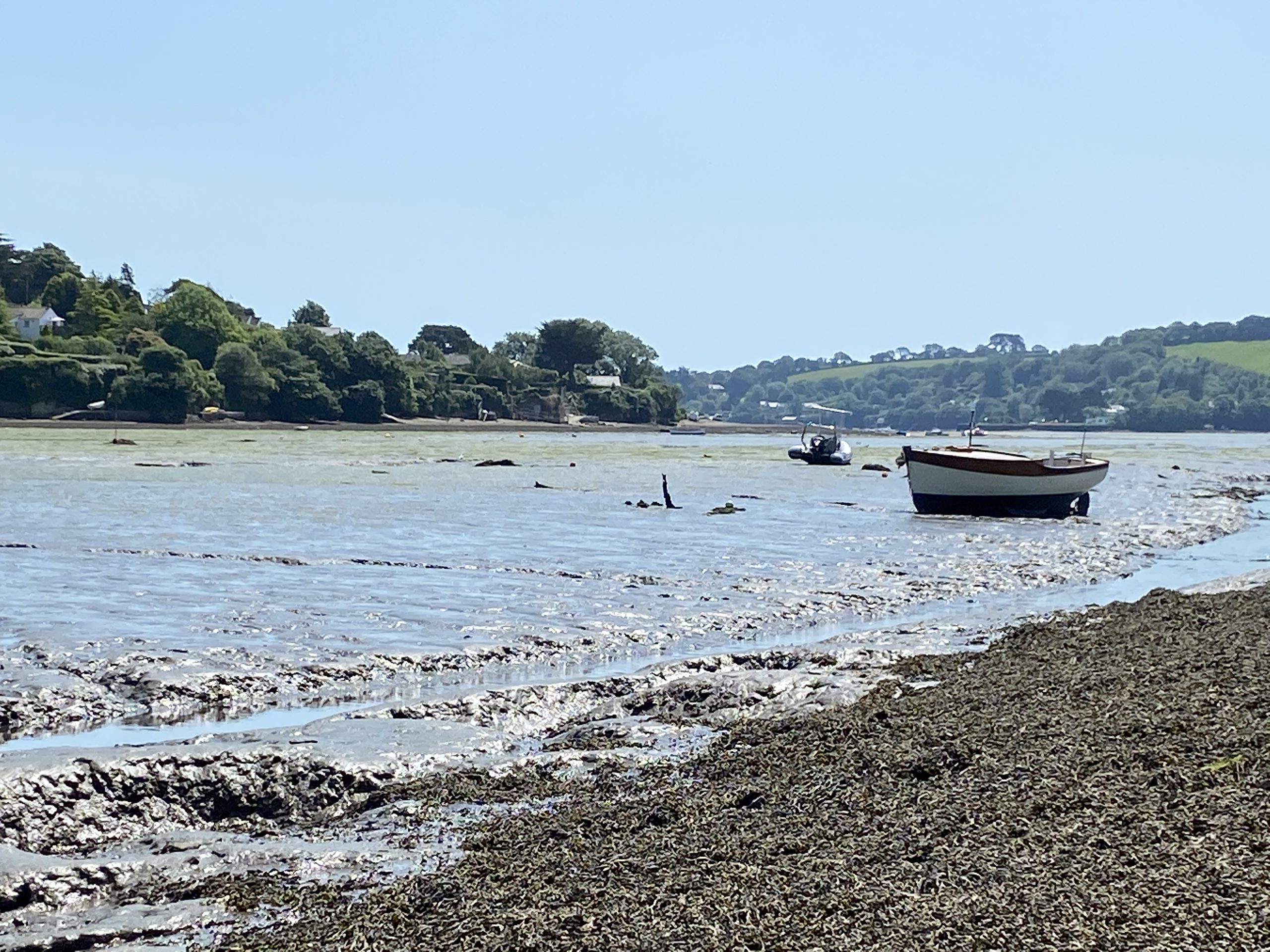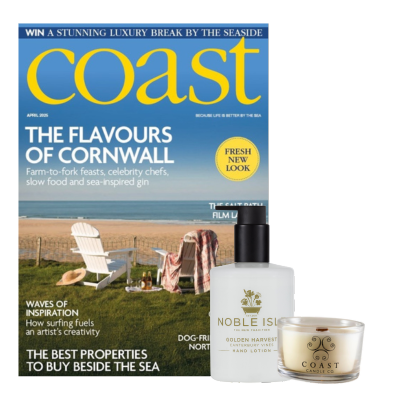Potter Jacqueline Clark has embraced coastal life to the full, setting up her studio on a tidal inlet and finding inspiration from the sublime scenery that surrounds her
Words ALICE WESTGATE Photographs BRYAN CLARK
A short bike ride along the disused tramway takes potter Jacqueline Clark from her home to her creek-side studio. As she opens its doors and brews some coffee, she contemplates the sea and the tide, allowing them to permeate the work she is planning. ‘When the tide is up, the water is just a few metres from my window,’ she explains. ‘At low tide, the creek mud looks like a field of clay, with little channels running through it. Along with the working boatyard on the opposite bank, the houses, the rocks, the wildlife and the plants at the margins of the creek, it all finds its way into my pots.’ Her work includes hand-built and thrown ceramic forms, from vases to tableware. ‘Their rims are often turned inwards to echo a boat’s gunwales, the turning lines in the clay are loosely reminiscent of planking on a wooden craft and I inscribe the clay with marks that reference the reeds on the opposite shore,’ she says.
Jacqueline has always felt connected to the sea and, as a child, sailed up and down the Kent coast in a 40ft boat built by her father in their garden. After gaining a degree in ceramics from what is now Cardiff Met, she settled in the Kent town of Sevenoaks with husband Bryan, a graphic designer, and their two children, working as an art teacher, then as head of art at Rochester Independent College. When a new job for Bryan prompted a move to Cornwall in 2005, they jumped at the chance to reconnect with the coast and bought a house in Devoran, a village between Falmouth and Truro.

FINDING HER FEET
At first, she worked in a studio in their garden. But in 2017 a friend, Sue Cooper, who lives in nearby Penpol, offered her the chance to convert a waterside outbuilding into a pottery with enough space to host courses as well as pursue her own work. Accommodation for visiting students would be available at Sue’s house. ‘My background has involved a lot of teaching and I was keen for that to continue, and the new studio offered me a brilliant opportunity to share my skills in an extraordinary location.’ Grant funding from Cultivator, a business support project run by Creative Kernow, helped her kit out the pottery, which has four electric wheels and an electric kiln.
Though Penpol is now a peaceful tidal inlet, in days gone by it was a busy commercial waterway thanks to the demand for locally mined copper and tin, and its banks were dotted with wharves, boatyards and smelting works. Few traces of this industrial past remain, but Jacqueline is acutely aware of the legacy. ‘My work incorporates the unseen as well as the seen life on the creek,’ she says. ‘In ceramics, there are a lot of metal oxides – copper oxide in a glaze, for example, can create a vivid turquoise – so using them on my pots is a nod to the area’s history.’

SHORESIDE FIRING
Perhaps the deepest connection with Cornwall’s coast is forged when, several times a year, Jacqueline holds raku firings on the shore. She specialised in this traditional Japanese technique as a student and investigated it deeper on a trip to Japan in 2015. ‘I love raku and it seems particularly relevant here as it links all the elements: clay from the earth, fire from the kiln, air to moderate the temperature of the firing and water from the sea to cool the pots afterwards. It makes me feel wonderfully in tune with my surroundings,’ she says.
As well as raku pieces, Jacqueline’s current work includes the Tidal range, inspired by the creek in different states and featuring soft greys and greens, as well as vivid blues and turquoises, to reflect varying seasons. ‘The Low Tide pots have a super-matte finish that looks like the creek mud, and one of my favourite grey glazes gives the kind of soft focus you get on a mizzly day.’
Another design is called Waters Edge, which suggests the intersection of land and sea. ‘These pots are dipped in several different glazes and I work carefully to create a thin strip that represents a landmass.’ Then there’s Waterline, a series of pots with a Japanese-style swish of cobalt. And finally, Jacqueline has produced a sequence of ceramic boats inspired by vessels in the local boatyard. ‘I love the way they sit on the mud at different angles at low tide,’ she says.
All her pieces are made with clay from Doble’s clay pit in St Agnes. ‘There’s more to my pots than the patterns and colours on their surface,’ she explains. ‘The concept of the coast runs deeper than that, right down to the clay, and this is an integral part of my work.’

POTTER AT LARGE
When Jacqueline isn’t in her studio, she can be found at the Leach Pottery, where she works two days a week as a learning and participation officer. She also accepts private commissions, many of which are inextricably linked to the sea. A recent project involved making tableware to use aboard Pellew, a classic Falmouth pilot cutter built in Truro using traditional methods. ‘I started with a range of mugs that are designed to withstand the pitching and rolling of the boat at sea – they are quite shallow and have a wide base to increase stability. I then took some wood that had been discarded during the boatbuilding process and burnt it, making a glaze with the ash to deepen the connection between pot and boat.’
Visitors to this hidden corner of Cornwall might glimpse batches of newly thrown pots drying out on the roof of an outbuilding or balanced along the edge of the creek. It’s so intoxicating that Jacqueline’s working day sometimes continues late into the evening. ‘I regularly get calls from my family at midnight asking where I am,’ she laughs. ‘It’s very easy to lose track of time when I’m here, as the setting always puts me in a wonderfully creative frame of mind.’
For more inspired by the sea stories, head to the Coastal People section or pick up a copy of Coast!
FIND OUT MORE
Studio: Jacqueline Clark Ceramics, Waters Edge Studio, Penpol, Cornwall, TR3 6NW (07954 325322, jacquelineclark.co.uk).
Galleries: See Jacqueline’s pots and buy online from the Leach Pottery, Higher Stennack, St Ives, Cornwall, TR26 2HE (01736 799703, leachpottery.com). Or view her work at The Guild of Ten, 19 Old Bridge Street, Truro, Cornwall, TR1 2AH (01872 274681, guildoften.com) or at Trelissick Gallery, Feock, Cornwall TR3 6QL, run by the National Trust in partnership with Cornwall Crafts Association (01872 864514, cornwallcrafts.co.uk).
Pottery workshops: Courses at Waters Edge Studio run from Easter until October. Half-day taster session £75; one-day throwing course £150; three-day throwing course £450. All prices include tuition, materials and firing. Raku firings take place on the creek and cost £50pp for a half-day. Email [email protected] for dates and details.
Stay: B&B accommodation for course participants is available at Waters Edge – visit the website for more information.
If you’re searching for a staycation hotspot for your Cornish break, try these top Cornwall hotels.
Potter Jacqueline Clark has embraced coastal life to the full, setting up her studio on a tidal inlet and finding inspiration from the sublime scenery that surrounds her
Words ALICE WESTGATE Photographs BRYAN CLARK
A short bike ride along the disused tramway takes potter Jacqueline Clark from her home to her creek-side studio. As she opens its doors and brews some coffee, she contemplates the sea and the tide, allowing them to permeate the work she is planning. ‘When the tide is up, the water is just a few metres from my window,’ she explains. ‘At low tide, the creek mud looks like a field of clay, with little channels running through it. Along with the working boatyard on the opposite bank, the houses, the rocks, the wildlife and the plants at the margins of the creek, it all finds its way into my pots.’ Her work includes hand-built and thrown ceramic forms, from vases to tableware. ‘Their rims are often turned inwards to echo a boat’s gunwales, the turning lines in the clay are loosely reminiscent of planking on a wooden craft and I inscribe the clay with marks that reference the reeds on the opposite shore,’ she says.
Jacqueline has always felt connected to the sea and, as a child, sailed up and down the Kent coast in a 40ft boat built by her father in their garden. After gaining a degree in ceramics from what is now Cardiff Met, she settled in the Kent town of Sevenoaks with husband Bryan, a graphic designer, and their two children, working as an art teacher, then as head of art at Rochester Independent College. When a new job for Bryan prompted a move to Cornwall in 2005, they jumped at the chance to reconnect with the coast and bought a house in Devoran, a village between Falmouth and Truro.

FINDING HER FEET
At first, she worked in a studio in their garden. But in 2017 a friend, Sue Cooper, who lives in nearby Penpol, offered her the chance to convert a waterside outbuilding into a pottery with enough space to host courses as well as pursue her own work. Accommodation for visiting students would be available at Sue’s house. ‘My background has involved a lot of teaching and I was keen for that to continue, and the new studio offered me a brilliant opportunity to share my skills in an extraordinary location.’ Grant funding from Cultivator, a business support project run by Creative Kernow, helped her kit out the pottery, which has four electric wheels and an electric kiln.
Though Penpol is now a peaceful tidal inlet, in days gone by it was a busy commercial waterway thanks to the demand for locally mined copper and tin, and its banks were dotted with wharves, boatyards and smelting works. Few traces of this industrial past remain, but Jacqueline is acutely aware of the legacy. ‘My work incorporates the unseen as well as the seen life on the creek,’ she says. ‘In ceramics, there are a lot of metal oxides – copper oxide in a glaze, for example, can create a vivid turquoise – so using them on my pots is a nod to the area’s history.’

SHORESIDE FIRING
Perhaps the deepest connection with Cornwall’s coast is forged when, several times a year, Jacqueline holds raku firings on the shore. She specialised in this traditional Japanese technique as a student and investigated it deeper on a trip to Japan in 2015. ‘I love raku and it seems particularly relevant here as it links all the elements: clay from the earth, fire from the kiln, air to moderate the temperature of the firing and water from the sea to cool the pots afterwards. It makes me feel wonderfully in tune with my surroundings,’ she says.
As well as raku pieces, Jacqueline’s current work includes the Tidal range, inspired by the creek in different states and featuring soft greys and greens, as well as vivid blues and turquoises, to reflect varying seasons. ‘The Low Tide pots have a super-matte finish that looks like the creek mud, and one of my favourite grey glazes gives the kind of soft focus you get on a mizzly day.’
Another design is called Waters Edge, which suggests the intersection of land and sea. ‘These pots are dipped in several different glazes and I work carefully to create a thin strip that represents a landmass.’ Then there’s Waterline, a series of pots with a Japanese-style swish of cobalt. And finally, Jacqueline has produced a sequence of ceramic boats inspired by vessels in the local boatyard. ‘I love the way they sit on the mud at different angles at low tide,’ she says.
All her pieces are made with clay from Doble’s clay pit in St Agnes. ‘There’s more to my pots than the patterns and colours on their surface,’ she explains. ‘The concept of the coast runs deeper than that, right down to the clay, and this is an integral part of my work.’

POTTER AT LARGE
When Jacqueline isn’t in her studio, she can be found at the Leach Pottery, where she works two days a week as a learning and participation officer. She also accepts private commissions, many of which are inextricably linked to the sea. A recent project involved making tableware to use aboard Pellew, a classic Falmouth pilot cutter built in Truro using traditional methods. ‘I started with a range of mugs that are designed to withstand the pitching and rolling of the boat at sea – they are quite shallow and have a wide base to increase stability. I then took some wood that had been discarded during the boatbuilding process and burnt it, making a glaze with the ash to deepen the connection between pot and boat.’
Visitors to this hidden corner of Cornwall might glimpse batches of newly thrown pots drying out on the roof of an outbuilding or balanced along the edge of the creek. It’s so intoxicating that Jacqueline’s working day sometimes continues late into the evening. ‘I regularly get calls from my family at midnight asking where I am,’ she laughs. ‘It’s very easy to lose track of time when I’m here, as the setting always puts me in a wonderfully creative frame of mind.’
For more inspired by the sea stories, head to the Coastal People section or pick up a copy of Coast!
FIND OUT MORE
Studio: Jacqueline Clark Ceramics, Waters Edge Studio, Penpol, Cornwall, TR3 6NW (07954 325322, jacquelineclark.co.uk).
Galleries: See Jacqueline’s pots and buy online from the Leach Pottery, Higher Stennack, St Ives, Cornwall, TR26 2HE (01736 799703, leachpottery.com). Or view her work at The Guild of Ten, 19 Old Bridge Street, Truro, Cornwall, TR1 2AH (01872 274681, guildoften.com) or at Trelissick Gallery, Feock, Cornwall TR3 6QL, run by the National Trust in partnership with Cornwall Crafts Association (01872 864514, cornwallcrafts.co.uk).
Pottery workshops: Courses at Waters Edge Studio run from Easter until October. Half-day taster session £75; one-day throwing course £150; three-day throwing course £450. All prices include tuition, materials and firing. Raku firings take place on the creek and cost £50pp for a half-day. Email [email protected] for dates and details.
Stay: B&B accommodation for course participants is available at Waters Edge – visit the website for more information.


















